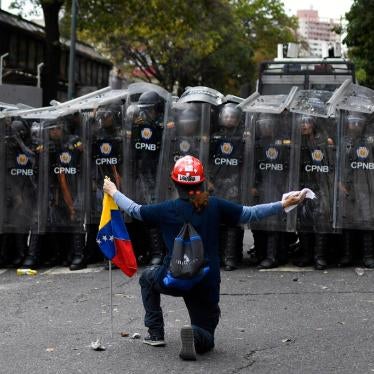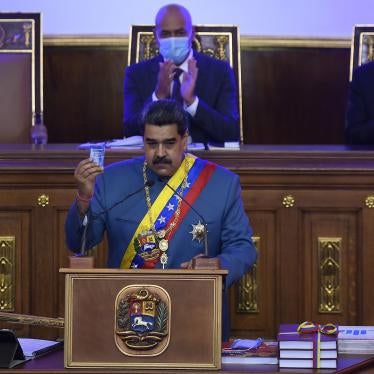The situation in Venezuela, an International Criminal Court (ICC) member country, has been under preliminary examination by the court’s Office of the Prosecutor since February 2018. The Office of the Prosecutor carries out preliminary examinations to determine whether a formal investigation by the court is warranted.
In December 2020, the office reported that based on the information available during the preliminary examination it had found a reasonable basis to believe that crimes against humanity had been committed in Venezuela. These include, at least since April 2017, the crimes against humanity of “imprisonment or other severe deprivation of physical liberty,” “torture,” “rape and/or other forms of sexual violence,” and “persecution against any identifiable group or collectivity on political grounds” by the civilian authorities, members of the armed forces, and government supporters. The office indicated that it would continue to assess relevant domestic proceedings, given that the ICC is a court of last resort, stepping in only when there are no genuine national proceedings.
At the end of her mandate in mid-June 2021, the then-ICC prosecutor, Fatou Bensouda, announced that her office had concluded its preliminary examination of Venezuela. Bensouda did not make the office’s conclusions public, given the then-pending litigation before the court launched by Venezuelan authorities asking for the court’s oversight of the prosecutor’s examination. Later in June, the ICC pre-trial chamber dismissed Venezuela’s request.
In reaching determinations as to whether a formal investigation is warranted in accordance with criteria set out in the Rome Statute, the ICC treaty, the Office of the Prosecutor examines whether relevant national proceedings exist in relation to potential cases that could be included in an ICC investigation.
Under existing ICC case law, for the ICC to find a case inadmissible on the basis of national proceedings, there must be proceedings encompassing both the person and the conduct that are the subject of the ICC case. Furthermore, the state must demonstrate its genuine willingness and ability to conduct those proceedings. The Rome Statute provides guidance about the meaning of “unwillingness” and “inability” in article 17, which sets out admissibility criteria.
A state may be considered “unwilling” if: its proceedings are for the purpose of shielding the person concerned from criminal responsibility; there has been an unjustified delay that, under the circumstances, is inconsistent with an intent to bring the person concerned to justice; or
the proceedings were not or are not being conducted independently or impartially, and they were or are being conducted in a manner that, under the circumstances, is inconsistent with an intent to bring the person to justice.
When considering a state’s ability to conduct genuine national proceedings, the Rome Statute instructs the judges to consider “whether, due to a total or substantial collapse or unavailability of its national judicial system, the State is unable to obtain the accused or the necessary evidence and testimony or otherwise unable to carry out its proceedings.”
Human Rights Watch research has shown that Venezuela’s judiciary has failed to adequately investigate widespread abuses despite compelling evidence and that impunity for human rights abuses remains the norm. Since the late President Hugo Chávez and his supporters in the National Assembly carried out a political takeover of Venezuela’s Supreme Court in 2004, the judiciary has stopped functioning as an independent branch of government. Supreme Court justices have openly rejected the principle of separation of powers and have consistently upheld abusive policies and practices.
Human Rights Watch reports released in 2014 and 2017, which were shared with the Office of the Prosecutor, found widespread abuses during crackdowns in Venezuela. Security force personnel beat detainees and severely tortured them. Security forces also used disproportionate force, violently abused people in the streets, and arbitrarily arrested and prosecuted government opponents. The nature and timing of many of the abuses – as well as the frequent use of political epithets by the abusers – suggest that their aim was not to enforce the law or disperse protests, but rather to punish people for their perceived political views.
Human Rights Watch research shows that the abuses were not isolated cases or the result of excesses by rogue security force members. Instead, the repeated widespread violations by multiple security forces, during a specific time frame, and in numerous locations, support the conclusion that the security force abuses have been systematic. Human Rights Watch also documented cases of enforced disappearances for days or several weeks, and other egregious abuses since 2014.
In addition to the repression on the streets, Human Rights Watch has documented the arbitrary arrest and torture of suspected coup plotters and their family members, extrajudicial killings by a special police force, egregious abuses by armed groups and Venezuelan security forces in the Venezuelan border with Colombia, abuses in Venezuela’s gold mining industry, attacks on free speech, and harassment of humanitarian actors and human rights defenders. Venezuelan authorities have used Covid-19 emergency measures as a pretext to intensity a police state and control of the population.








